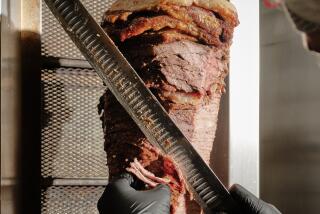Certifying Products Is Big Business : Many Gentile Consumers Like Their Food Kosher
- Share via
NEW YORK- — We’re not all Jewish, but we probably all eat kosher food.
Smuckers Natural peanut butter, for example, or Krasdale mayonnaise or French’s Bold ‘n’ Spicy mustard, are kosher foods. Close examination of the labels on many nationally distributed food products reveals tiny kashrus symbols certifying them as kosher, or acceptable under Jewish dietary laws.
Hundreds of well-known products, from Quaker Instant Oats to Dannon yogurt, are marked with one of the 60-odd kashrus symbols, each no larger than the ubiquitous registered trademark symbol “R” inside a circle. Each mark signifies the authority of a rabbi or an institutional group of rabbis that supervises production of hundreds of products, all in accordance with the kosher laws governing the preparation of meat and keeping it separate from dairy products.
“ ‘Kosher certified’ means that somebody is taking money to guarantee that it’s kosher,” said Rabbi Yosef Wikler, editor of Kashrus magazine, which lists virtually every kosher certification symbol worldwide. He said the size and reputation of these organizations varies greatly.
Symbols of Quality
“Some people who are not necessarily following a kosher diet look for the symbol as a way of ensuring quality,” said Barbara Beck of Dannon. She said the company’s refrigerated yogurt has carried the symbol K inside a triangle, issued by Rabbi Dr. Joseph Ralbag of Manhattan, for 25 years.
Quality, or at least the idea of it, has helped create a $1-billion market for kosher foods, said David A. Weiss, president of Packaged Facts, which issued a 120-page market survey of the kosher-foods industry last December. “There are whole groups, like Muslims, Seventh-day Adventists and others, who purchase it for nutritional reasons,” Weiss said, adding that only 25% of kosher food customers keep kosher households. The industry is expected to grow 8% a year over the next five years.
Wikler said that most groups recertify each product about once a month. He endorses no single agency or symbol, and said that some Jews distrust many of the labels. It is up to the individual to determine which labels spell “kosher,” he said.
Strictly Kosher Kosher
“After all, it boils down to everyone’s feeling about everyone else’s strictness of observance,” said Rabbi Laizer Teitelbaum, one of hundreds of supervisors at the Organized Kashrus Laboratories of Brooklyn. “What we’re saying is that we’re strict enough to satisfy the most strict ones,” he said of his group, which certifies products of international companies such as Beatrice/Hunt-Wesson and Kraft.
The Union of Orthodox Jewish Congregations in Manhattan, which has about 1,200 companies under its supervision, is backed by about 250 supervisors worldwide, Rabbi Menachem Genack said. Genack, a Union supervisor, said his group has earned respect because it is a nonprofit “communal organization, with a large constituency” that rolls uses its income to help support synagogues nationwide.
“It sounds like a business because it is a business,” Wikler said, with profit-oriented supervising agencies competing for contracts. None of the company spokesmen or certifying authorities interviewed would say how much it costs to be certified, although Wikler said it could be thousands of dollars.
Violations Reported
“Not all the companies like this,” Wikler said of the kosher symbols. “That’s why, for years, you’ve seen just a plain K” on some packages. Some food companies consider their products kosher but strict Jews do not. Wikler said he catches about 200 mislabelings each year and files complaints with agencies in the states where the violations occurred.
There are no federal guidelines. Early last month, for instance, New Jersey’s Kosher Food Enforcement Unit, part of the Division of Consumer Affairs, sent letters warning distributors that some of Hidden Valley Ranch’s creamy-herb flavor dry salad dressing was not kosher, although it had borne a mark of certification.
A Hidden Valley Ranch spokesman, Fred Reicker, said the product has been taken off the shelves, new labels without a kashrus symbol have been printed and a warning notice was posted in The Jewish Press newspaper.
The large number of kosher-certified products and symbols has not necessarily made more products kosher. “Jews work so hard to prepare and watch over food preparation, so people think they’re getting something safe,” Reicker said, adding that he was not certain that kosher foods are any more wholesome than others.
“That’s the great unknown,” he said.
More to Read
Eat your way across L.A.
Get our weekly Tasting Notes newsletter for reviews, news and more.
You may occasionally receive promotional content from the Los Angeles Times.










